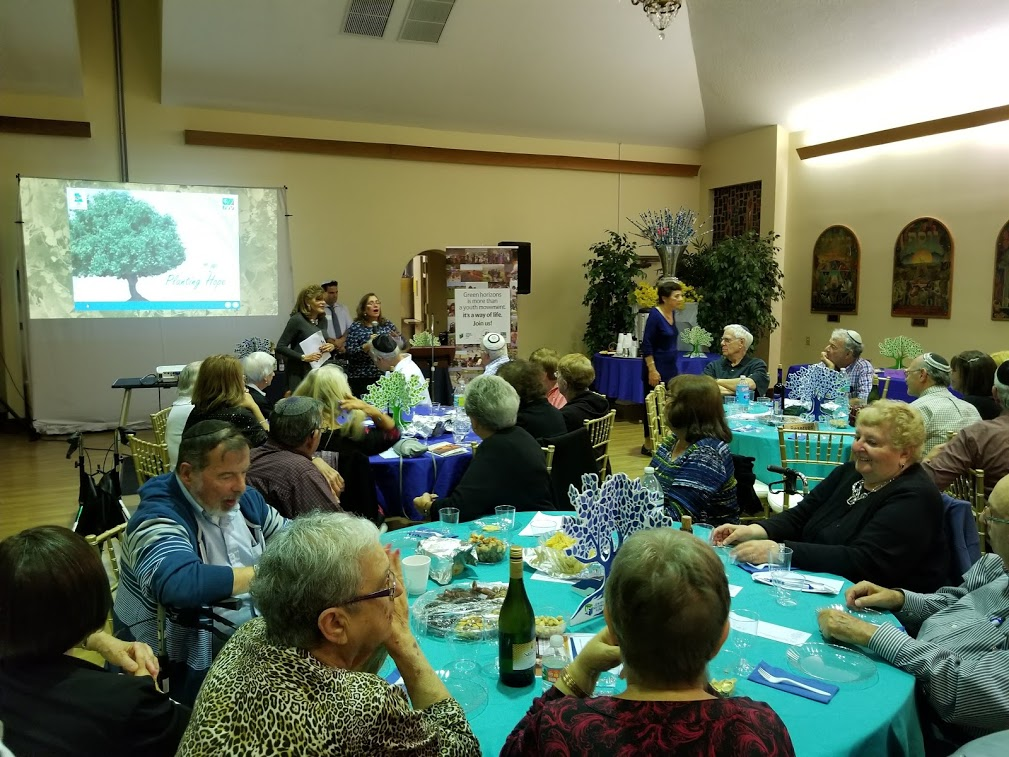Tu BiShvat is a special day on the Jewish calendar. It marks the start of a brand-new year for the trees and connects us to the environment in a uniquely spiritual way, reports Joseph Wolkin
At Jewish National Fund-USA (JNF-USA), Tu BiShvat is at the core of the Zionist movement as the organization plans to celebrate the festival on January 27 with a virtual Tu BiShvat seder hosted and created by Cincinnati’s Women for Israel Committee with event co-chairs Jan Armstrong Cobb and Gail Silver.

L to R: Marlene Ostrow, Rebecca Goldwasser, event co-chair Gail Silver, event co-chair Jan Armstrong Cobb at the 2020 JNF-USA Women for Israel Ohio Valley Tu Bishvat Seder
The holiday, which falls on the 15th of Shevat each year, is perhaps the ultimate Zionist holiday. Tu BiShvat commemorates a time to appreciate the land of Israel for all of its beauty and the miracles that have occurred for thousands of years. This year, in the middle of the COVID-19 pandemic, Tu BiShvat is as meaningful as ever.
“The first mention of there being a new year for trees is about 2,000 years ago in the Talmud,” Karen Thomashow, Associate Rabbi at the Isaac M. Wise Temple of Cincinnati, said. “In the Talmud, there are new years for a number of things, including trees, months, for the kings and one for the animals. The Kaballists who lived in Northern Israel about 300 years ago looked at this new year for trees and said it deserves a ritual.”

Participants at a JNF-USA Tu BiShvat Seder
Each Tu BiShvat, Jewish people in Israel and around the world celebrate this festival by hosting a seder, similar to Passover. Four cups of wine are poured to symbolize the four seasons, and you participants consume a plethora of new fruits and nuts.
“We say ‘thank you’ for our homeland and to pray,” said JNF Israel Emissary, Education, Zohar Vloski. “We say brachot (blessings) on the fruit and for the new year of the fruit.”

JNF Israel Emissary, Education, Zohar Vloski explains the importance of Tu BiShvat at a Tu BiShvat Seder.
For JNF-USA, Tu BiShvat is a time to reflect. It’s a time to appreciate how far the Jewish people have come after more than 2,000 years in exile before returning to the land of Israel.
One of the first ways that JNF supported the Zionist movement more than 120 years ago was to plant trees in Ottomon-ruled Palestine after land was purchased. The symbolism of trees marked the start of new life, as well as the Jewish people’s connection to their ancestral soil.
“It’s a Zionist holiday, a Jewish holiday, and it’s an Israeli holiday,” Vloski said. “It’s one of the most important holidays because everyone in klal Yisrael can say, ‘I belong.’ This is our homeland, and it’s a great way to plant trees in Israel. All over the state, we’re planting trees and celebrating Tu BiShvat.”
What makes Tu BiShvat different from other Jewish holidays is that it is a rabbinic one and not something out of the Torah. It truly began to spread across Jewish communities thanks to the early Kabbalists of the 16th century in Tzfat.
The connection between the Jewish people and the environment spans all the way back to the early days of creation, when Adam and Eve were in the Garden of Eden. This led the Kabbalists to truly appreciate Tu BiShvat for what it is: a day to honor the land.
“You work the land and you protect it,” Rabbi Thomashow said. “It’s the Jewish environmental title for how we should take care of the earth.

Karen Thomashow, Associate Rabbi at the Isaac M. Wise Temple of Cincinnati, will inspire participants at the upcoming Tu BiShvat Seder.
“I think Tu BiShvat in 2021 will be different and, hopefully, it’s the only Tu BiShvat during quarantine in a pandemic. It’s an opportunity to seek out Tu BiShvat seders, just like what JNF-USA is doing. We’re not only working the land, but we’re taking care of it.”
To register for JNF-USA’s January 27 Women For Israel Tu BiShvat seder, visit jnf.org/ondemand. The event, which kicks off at 8 p.m. ET, will be led by Rabbi Thomashow and Talia Tzour Avner, chief Israel Emissary of JNF. Women across America will tune in to celebrate their special connection to the environment, and the land and people of Israel.
For more information, contact Eric Goldstein, JNF-USA Executive Director, Ohio Valley at egoldstein.cinci@jnf.org or 513.794.1300 x780. To plant trees this Tu BiShvat, visit jnf.org/trees.
